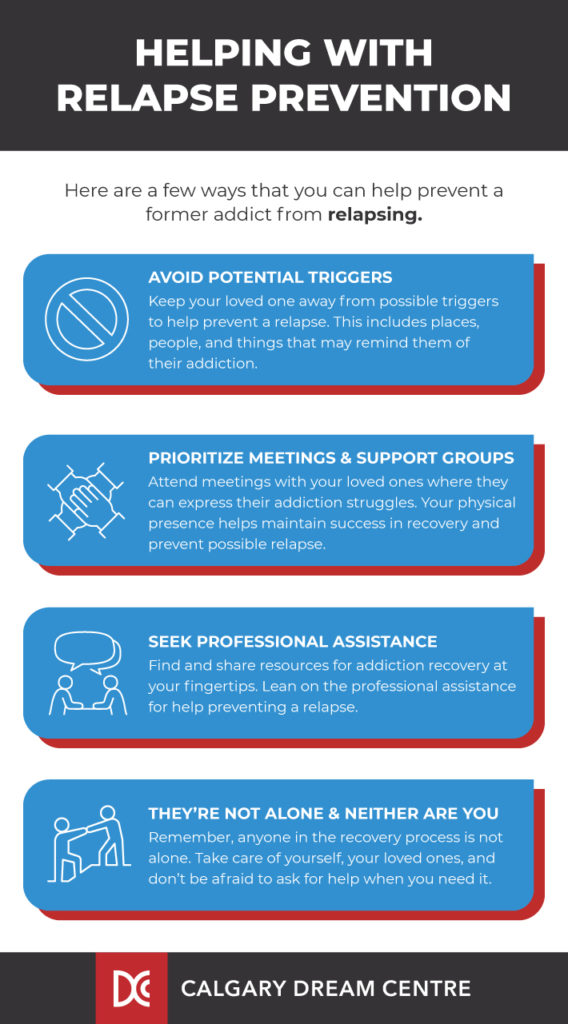It is undeniably challenging to support a loved one as they navigate recovery—whether it’s your friend, parent, sibling, child, or another relationship. We know how emotionally draining it can be when you spend so much energy just wanting them to be okay. It’s especially difficult when you’re unsure of the resources available to you or even where to look for them.
If you’re worried that your loved one may relapse, you should know that you don’t have to go through this alone. We’ve compiled some information to guide you through this taxing time. Relapse prevention is uncharted territory for most, and they are not easy waters to navigate. As we go through some recommended helping points, remember that through the process, you need to take care of yourself, too.
Understanding Their Addiction
Addiction takes many forms, each with its own set of struggles. This type of illness describes the problematic use of a substance or engaging compulsively in unwanted behaviours. Common types of addictions include:
- Nicotine or tobacco
- Alcohol
- Drugs and medications (both legal and illegal)
- Gambling
- Shopping
- Video games
- Using the internet or social media
If you need some more insight into your loved one’s addiction, observe their behaviour and consider the 4 Cs laid out by the Centre for Addiction and Mental Health (CAMH).
- Craving
- loss of Control of amount or frequency of use
- Compulsion to use
- use despite Consequences
Regardless of the kind of addiction that your loved one may struggle with, they have the underlying potential for a relapse, which could be a step backwards on the recovery journey.
What Is a Relapse?
Simply speaking, a relapse indicates when someone with an addiction returns to old behaviours or patterns. For instance, for someone who has a substance abuse disorder, a complete physical relapse could mean using the substance again, which can be fatal in some cases.
There are three stages of relapse: emotional, mental, and physical.
- In the emotional stage, your loved one may not be thinking about their addiction, but their emotions and behaviours could be setting them up for a physical relapse. This could appear as anxiety, anger, defensiveness, not asking for help, not attending meetings, or poor sleeping habits.
- In the mental stage, there’s a battle happening in your loved one’s mind between using and staying clean. Some signs of mental relapse for the person struggling include lying, fantasizing about using, hanging out with old using friends, and planning a possible relapse around other people’s schedules.
- In the physical stage, your loved one returns to their addictive behaviour, whether that’s having a drink, using drugs, gambling, or another kind of addiction. At this stage, the relapse happens quickly and is the most difficult to recover from.
How to Support Their Recovery
Loving someone with addiction comes with all kinds of emotions, not limited to sadness, fear, anger, denial, and hope. This illness strains many relationships, but you’re at the point when you’ve decided that you won’t let addiction triumph over your relationship. You want to be there for this person, no matter what.
The main goal is reminding them they’re not alone—whether that’s through your physical presence, picking up the phone when they call or explicitly saying you’re by their side—show that you’re there to support them. Remember never to blame your loved one for their addiction or tell them how to approach recovery since there’s no one-size-fits-all answer.

Avoid Potential Triggers
Showing that you understand your loved one’s addiction is a delicate dance. You don’t want to come off as if you understand their struggle more than they do. But being empathic to their situation can be expressed through what you avoid.
A relapse can happen suddenly and is often triggered by something pertinent to their addiction. By avoiding certain people, places, or things, you can help your loved one prevent relapse.
Common triggers include exposure to substance use, seeing an addiction object (like syringe or alcohol bottle), locations where they used to use, social pressures, or using other substances.
As you support your loved one with their recovery, it’s best to avoid high-risk situations that have the potential to trigger a relapse.
Prioritize Meetings & Support Groups
During recovery, meetings and support groups are paramount for continued success. Whether your loved one attends a 12-step program like Alcoholics Anonymous or visits support groups for recovering from abuse, it is always welcome to attend the meetings with them.
People struggling with addiction often feel isolated and alienated, so showing up with your physical presence expresses that you support them and they are not alone.
Seek Professional Help
When you feel like you’ve tried all you can, treatment centers and mental health professionals are available to lean on. Remember, you don’t have to do any of this alone, and neither does your loved one.
Treatment programs specifically designed to help men’s recovery, women’s recovery, or those transitioning from homelessness, are available at the Calgary Dream Centre. And if you simply need assistance on where to start, we can help you find help.

They’re Not Alone & Neither Are You
No matter where your loved one is on their recovery journey, and regardless of how long you’ve been by their side, there is always a resource to help you and them along the path.
We understand how heartbreaking the recovery process can be, and we’ve devoted ourselves to providing support whenever and wherever it’s needed. Please, don’t hesitate to reach out if you need to.



